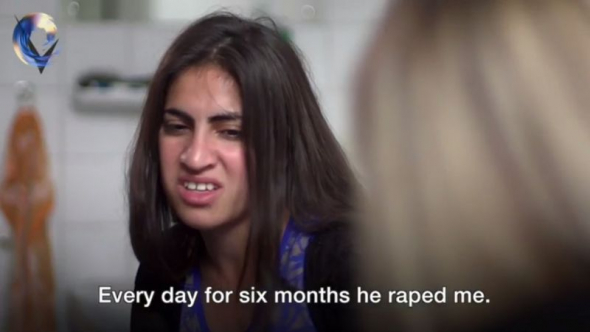Schoolgirl describes trauma of being raped every day by ISIS 'beast' who chose her from 150 girls 'by drawing lots'

A Yazidi girl who was 14-years-old when she was kidnapped by the Islamic State terror group in northern Iraq has said she was raped every day for six months by a radical she described as a "beast."
The girl, identified as Ekhlas, told the BBC's Victoria Derbyshire show in an interview published on Monday that she tried to kill herself during the ordeal.
"He picked me out of 150 girls by drawing lots. He was so ugly, like a beast, with his long hair. He smelt so bad, I was so frightened I couldn't look at him," Ekhlas said of the man who abused her.
The girl was captured along with thousands of others in 2014 when close to 40,000 Yazidis took refuge at Mount Sinjar, looking to escape the radical Islamists.
Eventually she managed to escape while her captor was away and made it to the safety of a refugee camp.
"How am I telling you this without crying? I tell you I ran out of tears," she said in the interview.
Ekhlas is now receiving therapy and education in a psychiatric hospital in Germany, where she lives, and has been raising awareness about the atrocities carried out by the terror group.
Several other Yazidi activists have also spoken out about the horrors women and children are subjected to under IS' captivity.
Nadia Murad, who has shared her story in conferences around the world, returned in June to the liberated Yazidi village of Kojo in Iraq where she was taken and where her family was killed.
"We hoped our fate would be to be killed like the men instead of being sold and raped by Syrians, Iraqis ... Tunisians and Europeans," Murad said of the women and girls who were kidnapped by IS and sold into sex slavery.
She explained how an IS commander demanded the Yazidis convert to Islam, but the captives refused.
"He demanded we change our religion but nobody agreed."
"We heard the sound of shots. At first, we believed people had come to help us, but when we looked out of the windows ... we saw them killing the men," Murad continued.
"We cried to the U.N., Europe, Kurdistan and Iraq but nobody came to help us. Today, the village is surrounded by mass graves."
A separate report published by The Guardian on Tuesday shared the stories of several other women who had fled from the Islamic radicals.
Human rights lawyer and gender justice advocate Sherizaan Minwalla said, "Some of these women and girls resisted forced conversion, protected themselves against violence, or at least tried to, and protected their children. How they resisted really shows incredible intelligence, courage and strength,"
The report noted that it's difficult to estimate the precise number of Yazidis who are still being held by IS, though activists are urging for more action to rescue them.
"Sometimes I watch the TV and I see the news of the army taking more land and villages, but it's not this that we are worried about — it is our people who are still imprisoned," said Leila, one of the women who was sold as a sex slave.
"We know most of them are in Raqqa, so why are [the army] not going to save them there?" she asked.
This article was originally published in The Christian Post.











